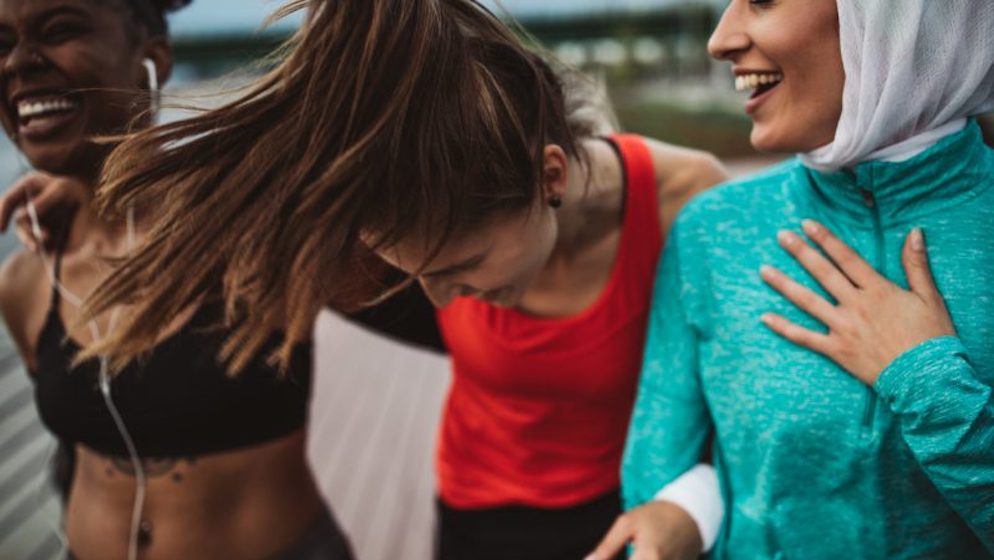New to working out? 6 tips from people with IBD

By Jenna Pettit, Guest Contributor
Some research shows that for people with mild to moderate IBD, exercise may help boost quality of life. But it’s not that simple. Many of us feel self-conscious, unmotivated, or anxious to work out. As someone who has Crohn’s disease, I can relate to those worries, which is why I interviewed a few people living with IBD about what advice they’d offer to a workout newbie.
So, before you swear off working out—consider these tips, which might help motivate you to break a sweat. But before you get started, check with your GI provider about your individual care plan and how that might impact exercise.
Find something you love
Ulcerative colitis advocate Jordan Wilson, 35, Orange County, California, has been spinning or cycling for three years and is now a cycle instructor.
Wilson’s advice to IBD patients looking to get into cycling? “Stay hydrated! As a J-pouch patient myself, I have a greater risk of getting dehydrated so I make sure to drink plenty of water before, during, and after an indoor cycling class.”
Another tip from Wilson—use the bathroom before your workout. “I don’t want to be distracted by the urge to go to the bathroom while I’m working out. So, if I go right before, I usually am able to get through the entire workout with no issues.”
Get moving with low intensity
Troy Parsons, a Crohn’s disease advocate and men’s physique competitor says yoga can be a great way to boost your health and stay active—especially if high intensity exercise may not be possible (like when you’re living with a chronic illness). Parsons, 27, Vancouver, BC, Canada, doesn’t consider himself a yogi or even the type of person you’d typically see at a yoga class, but it works for him—especially if he’s flaring.
“When my disease is active, or I need to listen to my body and slow down, yoga is my go-to low impact exercise. I find it particularly helpful when I’ve overexerted myself, feeling stressed or unable to do other types of exercise due to IBD, I find yoga is a great way to get myself moving.”
Calm your nerves
If your IBD symptoms are holding you back from the gym, consider these tips and plan ahead.
- Bring a water bottle and snacks: Staying hydrated is an important part of exercise, so bring a water bottle to make sure you always have access to water.
- Pack extra pants: I always bring a pair of extra workout pants just in case of an accident.
- Introduce yourself: If you’re participating in a group fitness class, go up to the instructor and introduce yourself. You can tell them about your condition and ask them if there are any modifications you can make. Also, find a spot in the class where you feel comfortable and where you can see the instructor.
Consider your joints
Arthritis is a common IBD complication. In fact, up to 25 percent of people with Crohn’s or ulcerative colitis experience arthritis.1 If you’re looking for a joint-friendly workout, then try:
- Walking: If you plan to start a walking regimen, be sure to talk to your doctor first. He or she can advise on how much physical activity you can manage. Then invest in a pair of comfortable walking shoes, turn on the tunes, and hit the pavement.
- Swimming: This exercise is widely considered to be joint-friendly because the buoyancy of the water supports your body weight, thus putting less stress on joints that normally withstand high impacts. But be mindful: overuse and faulty swimming form can lead to shoulder, knee, and neck injuries. Before you hit the lap pool or beach, remember to talk to your doctor and get their okay.
Loop in your doctor
Yoga, strength training, walking—no matter what exercise you try, talk to your GI provider first. They can provide guidance on the right exercises for your needs, plus help you figure out how much exercise you should be doing.
Do what you can
Whether you’re in a group fitness class or working out solo—do only what you can handle. You don’t always have to give 100 percent in every workout. Listen to your body. It’s okay to take breaks. It’s okay to modify. There are days I feel fatigued and I just do the best that I can. I am still proud of myself for showing up and doing what I could.
Medically reviewed by Jenny Blair, MD


